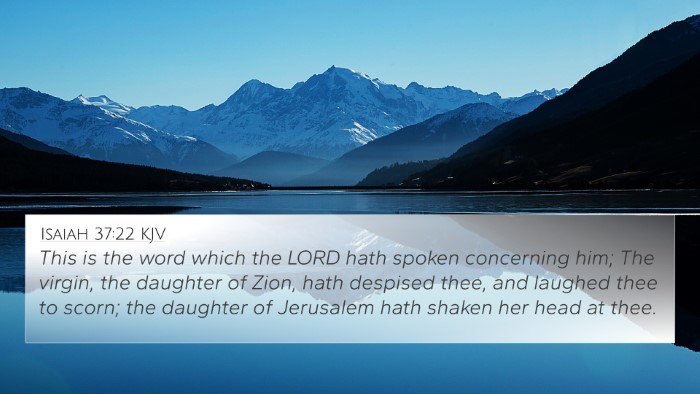Lamentations 2:13 - A Comprehensive Analysis
Verse Reference: Lamentations 2:13 (KJV)
"What thing shall I take to witness for thee? what thing shall I liken to thee, O daughter of Jerusalem? what shall I equal to thee, that I may comfort thee, O virgin daughter of Zion? For thy breach is great like the sea: who can heal thee?"
Summary and Interpretation
This verse poses a poignant question reflecting the deep sorrow of Jerusalem after its destruction. The lamentation illustrates the profound loss experienced by the people and the difficulty in finding adequate words or symbols to comfort them. Let's delve deeper into each component with insights from notable commentaries.
Insights from Public Domain Commentaries
- Matthew Henry: He reflects on the overwhelming grief expressed in this verse. Henry suggests that the speaker is at a loss for proper expressions of sympathy, stressing the uniqueness of Jerusalem's suffering. He emphasizes that despite the availability of various examples and analogies, none can truly encapsulate the depth of their pain.
- Albert Barnes: Barnes explores the rhetorical style of the verse, noting that the questions posed serve to heighten the sense of despair. He identifies that the "breach" refers to an overwhelming calamity that cannot be easily remedied, likening it to the vastness of the sea. This imagery evokes a feeling of hopelessness amidst trial.
- Adam Clarke: Clarke aims to contextualize the passage within the broader narrative of Lamentations. He notes that the verse serves as a cry for divine intervention, hinting at the futility of human efforts to mend the devastation. Clarke also describes how the personification of Zion reflects the intimate relationship between God and His people.
Thematic Connections
The theme of lament permeates the Book of Lamentations, emphasizing sorrow, loss, and the quest for comfort. This verse particularly stands out as it contemplates the lack of solace available to a wounded community. It raises crucial questions about suffering and the search for comfort, echoing throughout scripture.
Cross-References
In examining Lamentations 2:13, we observe several related biblical passages that amplify its themes:
- Jeremiah 8:21 - Reflects a similar sentiment of mourning for the daughter of Zion.
- Psalm 30:5 - A reminder that sorrow may last for a night, but joy comes in the morning, offering hope amidst despair.
- Isaiah 40:1-2 - God's comfort to His people after their suffering parallels the quest for comfort in Lamentations.
- Matthew 5:4 - “Blessed are those who mourn, for they will be comforted,” draws connections to the need for divine comfort.
- 2 Corinthians 1:3-4 - Talks about God as the Father of all comfort, linking to the themes of healing and solace.
- Romans 8:18 - The comparison of present sufferings with future glory enhances the understanding of divine redemption after calamity.
- Revelation 21:4 - Assures that God will wipe away every tear, showcasing the culmination of divine comfort that is hoped for in Lamentations.
Additional Thematic Elements
Through cross-referencing these scriptures, we gain a deeper understanding of the biblical context surrounding Lamentations 2:13:
- Divine Justice and Mercy: The verses illustrate the balance between God’s judgment and His mercy toward His people, offering comfort during distress.
- The Human Experience of Suffering: This verse draws parallels with the broader human condition, reflecting universal themes of grief and the search for healing.
- Hope Amid Despair: The interconnected verses remind us that, while suffering is real, the promise of comfort and restoration is a recurring theme in scripture.
Conclusion
Lamentations 2:13 serves as a powerful reminder of the weight of sorrow and the deep longing for comfort found in God. The rhetorical questions it poses highlight the challenges faced during times of distress, while encouraging readers to seek connections with other scriptural texts that testify to God's faithfulness in times of trouble.
Exploring Cross-Referencing Techniques
For those interested in studying connections between Bible verses, tools for Bible cross-referencing can significantly enhance the understanding of thematic and contextual links. Here are some methods to facilitate this:
- Bible Concordance: Utilize a concordance to locate verses with similar themes or keywords.
- Bible Cross-Reference Guide: Refer to guides that outline related scriptures, helping to uncover the inter-Biblical dialogue.
- Cross-Reference Bible Study: Engage in group studies focusing on themes and cross-referenced verses, promoting deeper insights into the text.
- Comprehensive Bible Cross-Reference Materials: Utilize online resources or books dedicated to cross-referencing for enriched study.
Final Thoughts
Building connections between Bible verses can illuminate the texts and enhance spiritual learning. Lamentations 2:13 serves as a profound example of this process, encouraging believers to meditate on their sorrow in light of the comfort found throughout scripture.












